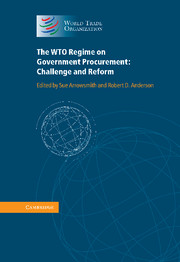Book contents
- Frontmatter
- Contents
- List of contributors
- Foreword by Pascal Lamy
- Perspective of the Chairman of the WTO Committee on Government Procurement, Nicholas Niggli (Switzerland)
- Preface
- Disclaimer
- PART I The WTO regime on government procurement
- PART II Expanding the scope of the Agreement on Government Procurement: accession and coverage
- PART III Revision of the procedural rules and other transparency provisions of the Agreement on Government Procurement
- PART IV Developing countries in the WTO procurement regime
- PART V Economic and social development (horizontal policies) in government procurement
- PART VI Enforcement and remedies
- PART VII Multilateralism and regionalism
- PART VIII Challenges and new directions
- 22 Ensuring integrity and competition in public procurement markets: a dual challenge for good governance
- 23 Developing multilateral rules on government procurement: the value of soft law
- 24 Work of UNCITRAL on government procurement: purpose, objectives and complementarity with the work of the WTO
- 25 Global procurement law in times of crisis: new Buy American policies and options in the WTO legal system
- 26 Procurement in times of crisis: lessons from US government procurement in three episodes of ‘crisis’ in the twenty-first century
- Index
- References
22 - Ensuring integrity and competition in public procurement markets: a dual challenge for good governance
from PART VIII - Challenges and new directions
Published online by Cambridge University Press: 07 September 2011
- Frontmatter
- Contents
- List of contributors
- Foreword by Pascal Lamy
- Perspective of the Chairman of the WTO Committee on Government Procurement, Nicholas Niggli (Switzerland)
- Preface
- Disclaimer
- PART I The WTO regime on government procurement
- PART II Expanding the scope of the Agreement on Government Procurement: accession and coverage
- PART III Revision of the procedural rules and other transparency provisions of the Agreement on Government Procurement
- PART IV Developing countries in the WTO procurement regime
- PART V Economic and social development (horizontal policies) in government procurement
- PART VI Enforcement and remedies
- PART VII Multilateralism and regionalism
- PART VIII Challenges and new directions
- 22 Ensuring integrity and competition in public procurement markets: a dual challenge for good governance
- 23 Developing multilateral rules on government procurement: the value of soft law
- 24 Work of UNCITRAL on government procurement: purpose, objectives and complementarity with the work of the WTO
- 25 Global procurement law in times of crisis: new Buy American policies and options in the WTO legal system
- 26 Procurement in times of crisis: lessons from US government procurement in three episodes of ‘crisis’ in the twenty-first century
- Index
- References
Summary
Introduction
Ensuring the effective functioning of public procurement markets necessitates addressing two distinct but interrelated challenges: (i) ensuring integrity in the procurement process (i.e. preventing corruption on the part of public officials); and (ii) promoting effective competition among suppliers, including by preventing collusion among potential bidders. These two challenges sometimes merge, for example where public officials are paid to turn a blind eye to collusive tendering schemes or to release information that facilitates collusion (e.g. the universe of potential bidders or the bids themselves). However, analytically, preventing corruption on the part of public officials and promoting effective competition between potential suppliers are separable challenges: the former (corruption) is first and foremost a principal–agent problem in which the official (i.e. the ‘agent’) enriches himself at the expense of the government or the public (i.e. the ‘principal’); while the latter (promoting competition) involves preventing collusive practices among potential suppliers and removing barriers that unnecessarily impede healthy competition.
The issue of ensuring integrity in public procurement processes has rightly received a good deal of attention at the international level in recent years. It is addressed by various international instruments, including: (i) the UN Convention Against Bribery and Corruption; (ii) the OECD Convention on Combating Bribery of Foreign Public Officials in International Business Transactions; and (iii) the OECD Revised Recommendation on Combating Bribery in International Business Transactions.
- Type
- Chapter
- Information
- The WTO Regime on Government ProcurementChallenge and Reform, pp. 681 - 718Publisher: Cambridge University PressPrint publication year: 2011
References
- 17
- Cited by

